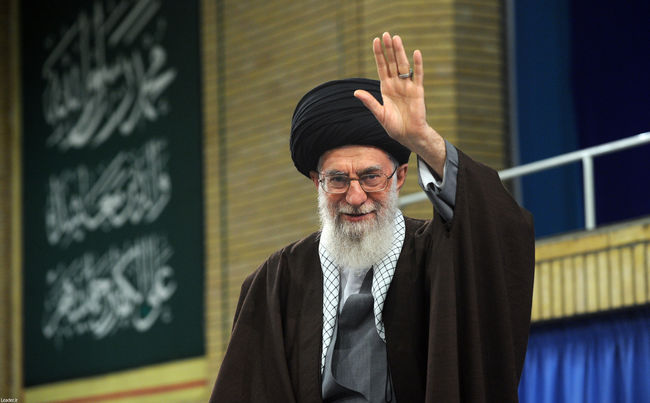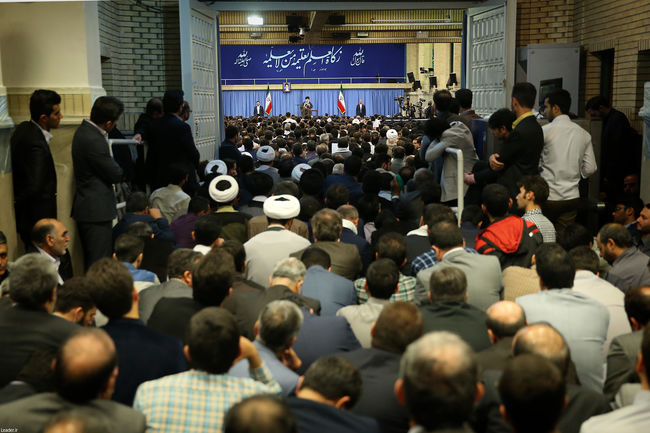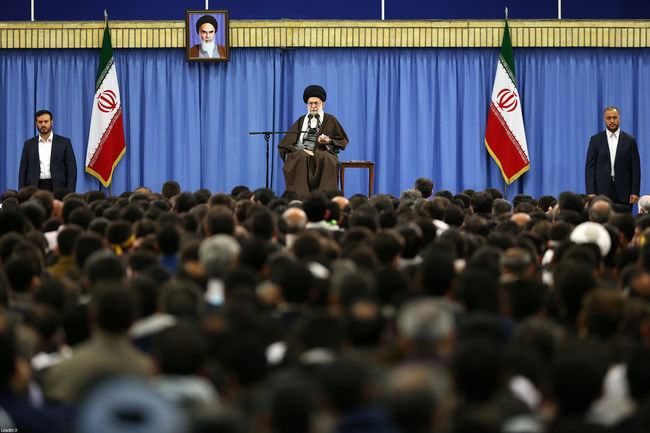Leader of the Islamic Revolution Ayatollah Seyyed Ali Khamenei, in a meeting on Monday with thousands of young and veteran teachers from across the country, praised efforts and endeavors of the community of teachers. Ayatollah Khamenei highlighted “training a future generation endowed an independent, honorable and religious identity and enjoying prominent and inspiring indices” as the main and very important task assigned to teachers and the education system, adding: “If a society with such features takes shape, an oil-independent Economy of Resistance, endowment with an independent culture, reforming the pattern of consumption and the spirit of steadfastness and resistance against excessive demands will definitely make sense.”
The Leader of the Islamic Revolution described teaching as a difficult job, saying: “Sincere work for the sake of God will be long-lasting and will bring about salvation. And in the profession of teaching, there is ground for sincere work.”
Ayatollah Khamenei cited the movement and works by Ayatollah Morteza Motahhari, a senior cleric gunned down after the Islamic Revolution and whose assassination is marked as Teacher’s Day in Iran, as an example of this sincere and blessed job, adding: “The result of sincerity of that scholar, who was familiar with his time and [temporal] needs, is the endurance of his prominent works such that decades after his martyrdom, thinkers are still making best benefits from the works of that great [scholar].”
“Of course, the sincerity and contentment of the community of teachers should not result in the officials’ negligence of the material and living issues of this hard-working community and as we have said time and again, any spending in and budget allocation to education is, in fact, an investment,” noted the Leader of the Islamic Revolution.
Ayatollah Khamenei went on to bring up the main issue of his address, saying: “The fundamental matter is to know how the education system is to train the future generation and what kind of generation the country needs for continuing its path.”
Before outlining the features needed for training the future generation, Ayatollah Khamenei highlighted a point, saying: “For training the future generation, we are not in an unrivalled space and field, but we are faced with a rival known as the ‘international system of dominance’.”
“Some may feel surprised about the relationship between the education system and the ‘international system of dominance’; however, the fact is that the system of dominance has a scheme for the younger generation of nations, particularly the nation of Iran,” added Ayatollah Khamenei.
The Leader of the Islamic Revolution referred to the United States, Zionist capitalists and some arrogant governments as manifestations of the “international system of dominance”, noting: “The system of dominance wants the future generation of countries to be a generation sharing its desired thought, culture, view and taste vis-à-vis global issues and finally [influence] elites, politicians and influential people so that they would think and act as it wishes.”
Referring to the history of this cultural scheme of colonialist powers, Ayatollah Khamenei said: “Western thinkers have time and again said that instead of colonialist expansionism of the 19th century, the best and the least costly way would have been inculcation of thought and culture to the younger generation of countries and training experts and elites that would act like soldiers of the system of dominance.”
The Leader of the Islamic Revolution said some governments in the region were a clear example of this planning by the global arrogance, adding: “These governments are doing exactly what the US wants and even they account for all its costs and get no quid pro quo and the only [thing they get] in return is that the Americans would protect these governments and prevent their downfall.”
Stressing that Iran’s rival has such a scheme for the future generation of Iran, the Leader of the Islamic Revolution underscored the necessity for spreading national thoughts and culture and language, adding: “Unfortunately on certain occasions, the English language is promoted instead of the Persian language and we have reached a stage that teaching the English language has spread to nursery schools.”
“That does not mean opposition to learning a foreign language, but the main issue [problem] is promotion of a foreign culture in the country and among children, young adults and youths,” said Ayatollah Khamenei.
The Leader of the Islamic Revolution reiterated that other countries have plans for countering the spread of foreign languages and cultures, saying: “Unfortunately in our country there is no specific plan for dealing with this issue and we have left the doors open for the spread of foreign culture.”
Ayatollah Khamenei referred to obstacles and hurdles in some Western countries to the spread of the Persian language adding: “Under circumstances that they do not authorize the spread of the Persian language, we are promoting their language and culture. Is this really logical?”
“These remarks do not mean terminating English language teaching at schools, but the main issue is to know our rival and how precisely the opposite party has made planning to influence the country’s future generation,” the Leader of the Islamic Revolution added.
Ayatollah Khamenei went on to elaborate on the characteristics and features needed for training the future generation of the country, saying: “The most important characteristic that must be taken into consideration in training schoolchildren is the formation of an ‘independent, honorable and religious identity’ in the future generation.”
“We should train young adults and youths so that they would look for independent politics, economy and culture and would negate any dependence in these issues,” the Leader of the Islamic Revolution said.
Ayatollah Khamenei said Iran is vulnerable to this issue, adding: “Showing interest more than enough in using foreign phrases is an example of this vulnerability which is a legacy from the diabolical [shah] regime.”
The Leader of the Islamic Revolution said a main requirement for the materialization of the Economy of Resistance is the formation of an independent identity in young adults and youths, noting: “As long as there is no spirit of independence and resistance and steadfastness, even if officials hold hundreds of meetings on the Economy of Resistance, the plan will not pay off completely and appropriately.”
“The Economy of Resistance, oil-independent economy and independent culture will make sense if an independent identity takes shape in the society,” Ayatollah Khamenei said.
The Leader of the Islamic Revolution said revival of “outstanding features and current-developing concepts” in the schoolchildren was another heavy task assigned to teachers and the education system, saying: “Faith, thought development, social participation and cooperation, and reforming the pattern of consumption are among these outstanding features which must grow in the future generation.”
Pointing to the existing problems in the country with regard to the pattern of consumption, Ayatollah Khamenei cited several examples, saying: “Consuming foreign-made products and smuggling of luxury commodities, worth tens and hundreds of billions [of dollars into the country] are examples of the wrong pattern of consumption in the country that must be reformed and one major infrastructure for their reform is culture building in the younger generation.”
The Leader of the Islamic Revolution said “tolerance of the opponent” was another outstanding feature of the future generation, adding: “Tolerance of the opponent has not been institutionalized in the society because as long as one speaks with the least sarcasm, he receives a punch in the chest. This means intolerance of opponents.”
Ayatollah Khamenei said “politeness and being polite” and “piety and non-aristocratic family training” were among the required features for training schoolchildren, noting: “Institutionalizing these features in the younger generation and developing culture about them are among the main tasks assigned to teachers and the education system.”
Noting that the education system cannot accomplish this “sacred task” by itself, the Leader of the Islamic Revolution highlighted the role of different sectors and bodies in this regard, adding: “The Education Ministry’s Office for Entertainment is among sectors assigned an influential role and heavy task. It must take steps in this path through industrious, target-oriented, intelligent and healthy actions in terms of belief, politics and ethics, and any negligence in this regard will hurt the education system and the future generation.”
The Leader of the Islamic Revolution said the Islamic Republic of Iran Broadcasting (IRIB) is one of organs responsible for the institutionalization of outstanding features in the future generation and culture development in this regard. Criticizing the performance of national media, Ayatollah Khamenei said: “Last [calendar] year too, some issues were highlighted about the necessity of precise and correct planning by IRIB for the younger generation, but unfortunately no action has been taken.”
“The IRIB must have some agenda for education by consulting thinkers and experts,” said the Leader of the Islamic Revolution.
Ayatollah Khamenei referred to a letter by one of schoolchildren who met with him last week complaining about lack of appropriate and influential plans for high school students on radio and television, saying: “At national media, there must be programs, made through artistic and expert methods, for intellectual, spiritual, religious and scientific satisfaction of youths and the current programs [aired] on some channels are by no means consistent with such needs.”
The Leader of the Islamic Revolution said the Ministry of Information Technology and Communications were among other organs responsible for training the future generation and referring to the extent of cyberspace and the daily growing pace of developments in this regard and the youths’ persistent communications with virtual space, adding: “Nobody is opposed to using cyberspace, but the main issue is that in such a domain, which is susceptible to deviation, the ground must be prepared for appropriate use and the cyberspace should not be abandoned uncontrolled.”
The Leader of the Islamic Revolution complained about the performance of the Ministry of Information Technology and Communications and the Supreme Council of Cyberspace, saying: “Nobody is seeking to block cyberspace because this is not wise, but why at a time other countries are defining frameworks for using cyberspace in order to protect their culture, have we abandoned cyberspace to its own fate?”
Ayatollah Khamenei said another requirement in the education system was injection of the spirit of joy and liveliness into teachers and reiterated the renovation of the country’s education system.
The Leader of the Islamic Revolution said the education system was outdated and old, adding: “The current education system is derived from Europe’s education system which has remained intact like an ‘artifact at a museum’ and has become outdated, while it is necessary for it to be updated.”
Ayatollah Khamenei said it was wrong to renovate the education system by imitating and copying the Western countries, adding: “Of course, benefiting from experiences is good, but thinkers must design and implement the modern education system within the framework of education overhaul plan.”
The Leader of the Islamic Revolution said attention to the significance of technical and vocational centers in “skill enhancement and efficacy of younger generation” as another priority of the education system, adding: “According to reports, there are 12,000 kinds of vocations in the society, but should all schoolchildren with different talents go through a single path in their education?”
“The talents of schoolchildren must be identified and grown so that the grown talents could give rise to initiatives in different professions and vocations,” said Ayatollah Khamenei.
Criticizing the “use of certain names and symbols related to the diabolic regime like harbingers” was another point in the speech by the Leader of the Islamic Revolution, addressed specifically to the education officials.
“In the education system, in light of the existence of associations like Student Basij (mobilization) and Union of Islamic Student Associations, certain titles bearing specific connotations should not be used,” said Ayatollah Khamenei.
The Leader of the Islamic Revolution went on to highlight the issue of public and private schools, saying: “According to the Constitution, education is an issue of government. Of course it does not mean that the government should shoulder all responsibilities. But the government must play a role in education and in this regard transforming public schools to non-profit ones on a daily growing basis, while some of them are charging heavy tuition fees, is necessarily not a just and well thought-out move.”
“The level and quality of public schools must be upgraded so as to further encourage the families to show more inclination toward these schools,” noted the Leader of the Islamic Revolution.
Ayatollah Khamenei highlighted the intellectual and practical health of the esteemed minister of education and reiterating the need for benefiting from this opportunity for accomplishing heavy tasks in this organ, he said: “The University of Education Ministry Staff is one of very important centers, in which investment could be made for quantitative and qualitative development.”
Wrapping up his speech, the Leader of the Islamic Revolution underscored the significance of building and empowerment of the country and the prominent role of teachers on this path. Noting that the most important power-maker element is “science”, Ayatollah Khamenei said: “Power does not depend merely on wielding arms, but ‘science, faith, national character, resistance and revolutionary identity’ are elements of power making.”
“The enemy will have to back down in the face of your strength, but when we hesitate and refrain from showing off the principles and elements of our power to the enemy or if we are scared, the enemy will grow ‘brazen’,” the Leader of the Islamic Revolution said.
Ayatollah Khamenei cited a proposal bandied about in the US Congress against naval drills by Iran, saying: “Today, the enemies are speaking out beyond their limits and for example they draft a plan requiring ‘Iran not to hold military drills in the Persian Gulf’ while such remarks are foolish and worthless.”
The Leader of the Islamic Revolution said the great and awake Iranian nation is in a position to respond to all these excessive demands, saying: “The Persian Gulf is the home and the venue of presence of the Iranian nation, and the Persian Gulf coast and much of the coasts of the Sea of Oman belong to this powerful [Iranian] nation, therefore we have to be present in this region, [stage] maneuvers and show off our power and [that] it is the Americans who must explain why they have come here from the other side of the world and launch war games.”
“This is how bullying powers must be countered and responded to,” noted the Leader of the Islamic Revolution.
Ayatollah Khamenei said the fact that Iran is getting stronger from day to day and is standing tall shows the failure of enemies and noted: “[The holy] Quran has taught us that we must prepare ourselves so as to strike permanent fear into the heart of enemy.”
Prior to Ayatollah Khamenei’s speech, Minister of Education Ali Asghar Fani commemorated revolutionary martyrs Ayatollah Motahhari, former President Mohammad-Ali Rajaei and former Prime Minister Mohammad-Javad Bahonar, and offering congratulations on Teacher’s Week, he said: “The Ministry of Education is making efforts to prepare the proper ground for the materialization of the Economy of Resistance through culture building.”
Noting that strategic education plans throughout the 6th Five-Year Economic Development Plan will be based on the enforcement of Overhaul Document, he said: “Drawing up the roadmap for overhauling the education system, defining new disciplines, upgrading the standing of teachers, drawing up strategic plans for education ministry staff universities and Shahid Rajaei Teacher Training Center, bolstering public participation and developing student research centers have been among the most important education activities over the past year.”



